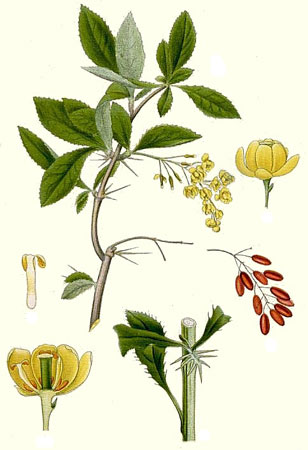Berberis vulgaris – Berberis vulgaris L.
Thorny shrub up to 1.5-2m, families barbarisovыh (Berberidaceae). Widely cultivated as an ornamental plant. For medical purposes use the roots of plants.

Berberis vulgaris – chemical composition
All organs of the plant contain alkaloids. The main alkaloid, isolated from the roots of Berberis vulgaris, яvlяetsя Barber. In addition berberine, in the roots of plants containing palmatin, Leonty, kolumʙamin, âtroricin, berberrubin and oksiakantin. Fruits apple barberry found, Citric, tartaric and other organic acids, sugar, pectin, vitamin C.
Berberis vulgaris – Pharmacological properties
Galenical dosage form of the roots of barberry at high doses inhibit the CNS in animals, violate the coordination of movements and relax muscles while maintaining a reflex activity. Preparations from the roots of barberry increase contraction of isolated uterine horn sea: pigs, stimulates bile secretion in animals in chronic experiments with fistula of the gall bladder, cause hypotension in rabbits, increase blood clotting. Tincture of barberry has inflammatory properties, manifested in lowering the tone of the gall bladder and in deceleration rate of its decline. This improves the flow of bile, and creates favorable conditions for the elimination of inflammation in the bile ducts and gall bladder.
In the experimental study of the pharmacological properties of individual alkaloid plants – berberine bisulfate - set, in subtoxic doses it as well as plant tincture, It causes some increase in locomotor activity, then alternating the state of the overall oppression.
In the experiment on cats when administered berberine bisulfate in therapeutic doses showed an increase in bile secretion. In chronic experiments on dogs with fistula of the gallbladder with the free flow of bile in the gastrointestinal tract of berberine resulted in a dilution of the bile with no noticeable increase in the number of its, lowering the relative density. In dogs with a bandaged common bile duct introduction of berberine in the stomach accompanied by a marked increase in the amount of bile released.
Berberis vulgaris – medical applications
Drugs Barberry is used as a choleretic agent in hepatitis, hepatocholecystitis, biliary dyskinesia (when the hyperkinetic form), cholelithiasis, uncomplicated jaundice. In obstetric practice barberry tincture prescribed as an adjunct to atonic bleeding in the postpartum period, bleeding, associated with inflammatory processes, when the uterus subinvolution, endometriosis.
Application berberika bisulfate vreparatov no other medical and physical therapy in patients with uncomplicated cholecystitis leads to a decrease or disappearance of pain in the right upper quadrant and dyspepsia, normalization of stool and temperature. In the study of duodenal contents after treatment berberine amount allocated gallbladder bile increased, it decreases the relative density, that due to the reduction of stagnation in the gallbladder. The concentration of bilirubin in the gallbladder bile drops. Side effects experienced by patients receiving berberine is not marked.
Positive results gives berberine and exacerbation of chronic cholecystitis, secondary complications of hepatitis. It improves the functional state of the liver, reduces the number of leukocytes in the bile. In chronic hepatitis of various etiologies expressed therapeutic effect of berberine in reducing the size of the liver, improving the performance of functional tests, reducing pain. Patients with chronic hepatitis B with the transition to cirrhosis, as well as cholelithiasis with secondary hepatitis, severe toxic hepatitis from biliary dyskinesia berberine ineffective.
Berberis vulgaris – Dosage Forms, Dosing and Administration
Tincture of the leaves of Berberis vulgaris. Assign alcohol (on 40 % alcohol) tincture (1:5) inside 30-40 drops 2-3 times a day. The course of treatment 2-3 weeks.
Store in a cool,, protected from light.
Berʙerina ʙisulьfat (Berberine bisulfase). Is the inside of 0.005-0.01 g (5- 10 mg) 3 times a day before meals. The course of treatment 2-4 weeks.
Infusion of leaves of Berberis vulgaris: 10 g (1 tablespoon) crushed leaves are placed in an enamel bowl, Pour 200 ml of hot boiled water, capped and heated in boiling water (in a water bath) 15 m, cooled at room temperature 45 m, filter, wring. The volume of the resulting infusion topped with boiled water to 200 ml. The prepared infusion stored in a cool place no more than 2 d.
Take 1 tablespoon 3-4 times a day as an anti-inflammatory agent in diseases of the liver and biliary tract.
The leaves are stored in a dry, cool place.
